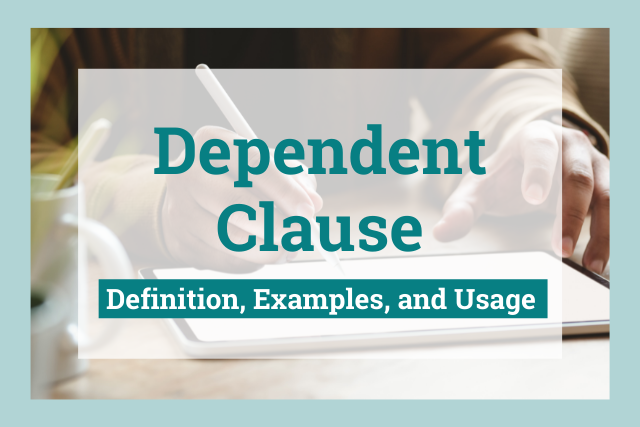
A dependent clause, also called a subordinate clause, is a part of a sentence that can’t stand alone.
Today, we’re learning all about dependent clauses.
What Is a Dependent Clause?
What does it mean when we say a dependent clause can’t stand alone? Let’s take a look at the dictionary definition of dependent clause and what this means in English grammar.
Dependent Clause: Definition
A dependent clause is a part of a sentence that has a subject and a verb but cannot stand alone as a complete sentence.
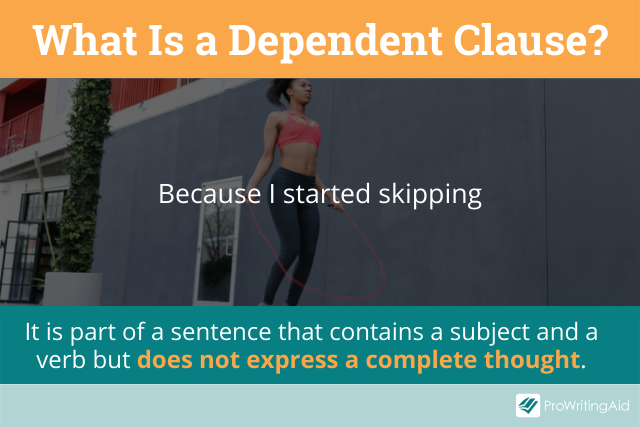
Dependent clauses often begin with subordinating conjunctions, which include words like although, because, and since.
Here’s an example of a sentence with a dependent clause. The dependent clause is in bold.
- I dropped the bottle because my hands were full.
Because my hands were full is not a complete sentence. It’s more than just a modifier or predicate, however, because there’s a subject (my hands) and a verb (were).
“Because my hands are full” is an incomplete thought and therefore not a full sentence. ProWritingAid can make sure that your dependent clauses aren’t standing alone!
Our grammar checker will highlight sentence fragments in your writing to ensure you’re expressing your ideas completely and clearly.
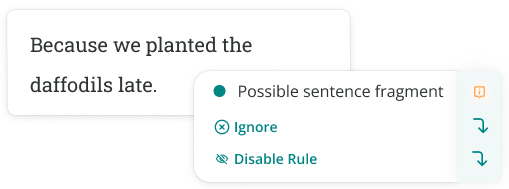
Dependent Clause: Meaning
We use dependent clauses to add more information to sentences. Dependent clauses are paired with independent clauses and may provide information like who, why, or how something happened.
Think back to our previous example. The independent clause “I dropped the bottle” is a complete sentence. Adding the dependent clause explains why I dropped the bottle.
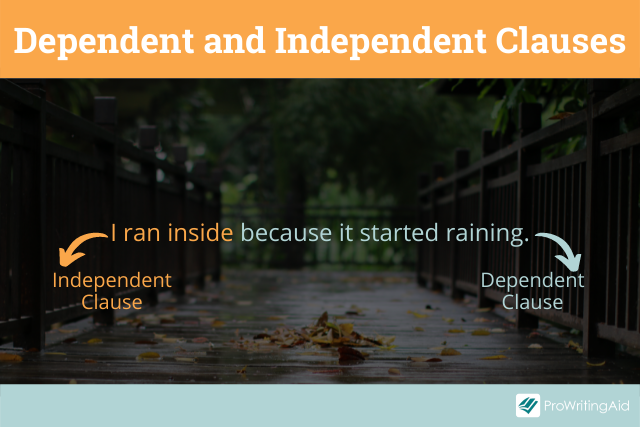
Because it does not express a complete thought, a dependent clause must be linked to an independent clause. This means that you can find dependent clauses in two types of sentences.
- A complex sentence contains one independent clause and at least one dependent clause.
- A compound-complex sentence contains at least two independent clauses with at least one dependent clause.
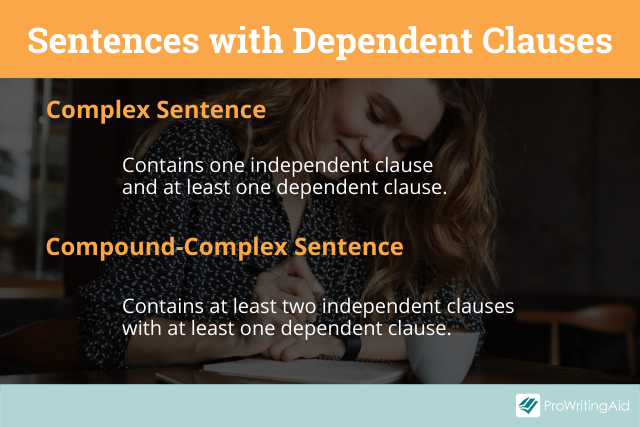
Dependent clauses are usually easy to identify within a sentence. Many times, they start with a subordinating conjunction. Here is a full list of common subordinating conjunctions.
| After | Because | So that | Until |
|---|---|---|---|
| Although | Before | Than | Wether |
| As | Rather than | Though | While |
| At | Since | Unless | If |
Dependent clauses can also start with relative pronouns. A relative pronoun stands in for a noun or noun phrase. Here is a list of relative pronouns.
| Who | That | What |
|---|---|---|
| Whom | When | Why |
| Whose | Where | Whoever |
| Which | How | Whosoever |
If you spot a subordinating conjunction or a relative pronoun, it’s a clue that you’ve found a dependent clause.
Then, look for the subject and the verb in that clause.
Finally, determine if the clause can express a complete thought. If not, you have a dependent clause.
How to Write a Dependent Clause
There are a few rules for writing dependent clauses. We already know that it must be paired with an independent clause, since a dependent clause can't stand alone.
The other rules deal with how to punctuate a dependent clause.
When a sentence starts with a dependent clause that acts as an adjective or adverb, put a comma after the dependent clause, before the independent clause.
Here’s an example:
- Until he learns to use the stove safely, he cannot stay at home alone.
If the dependent clause ends the sentence, you don’t need a comma. Check out the same example with the independent clause at the start:
- He cannot stay at home alone until he learns to use the stove safely.
Sometimes a dependent clause appears in the middle of a sentence. If it’s essential to the sentence’s meaning, it’s called a restrictive clause and doesn’t require a comma.
If the clause is just extraneous information, it’s called a non-restrictive clause (non-essential clause) and does require commas.
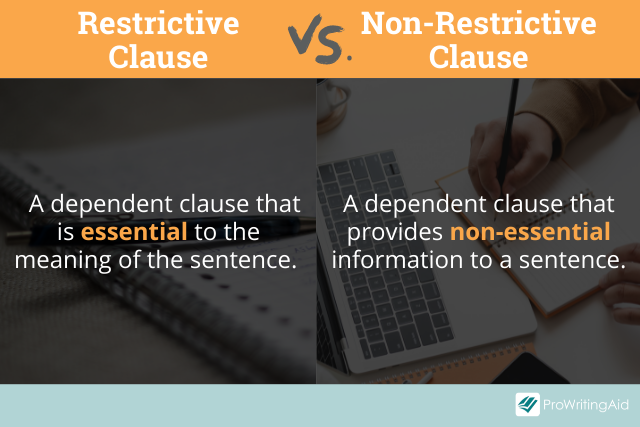
- My neighbor who has a red car always plays loud music on the weekends.
- My neighbor John, who has a red car, always plays loud music on the weekends.
In the first sentence, the dependent clause (who has a red car) is restrictive because it tells us which neighbor plays loud music.
In the second sentence, we already know which neighbor it is (John), so the dependent clause is extraneous information.
Types of Dependent Clause
There are three main types of dependent clause. They are named after the role they play in a sentence.
A dependent clause can act like an adjective, an adverb, or a noun. Let’s look at each of these in more detail.
Adjective Clauses
When a dependent clause provides information that describes a noun or pronoun, it’s acting like an adjective. This is called an adjective clause or a relative clause.
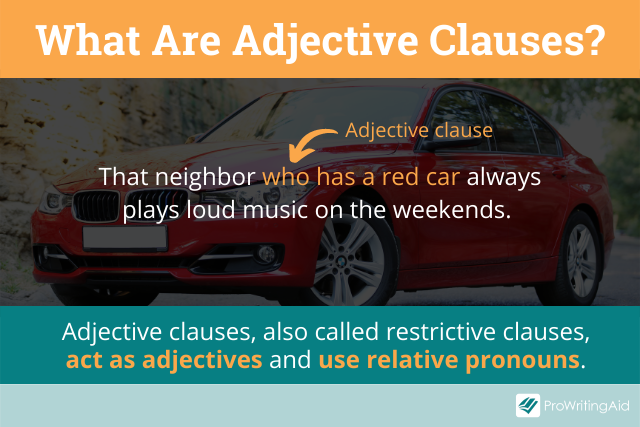
Adjective clauses usually begin with a relative pronoun.
Let’s return to our example of the neighbor who plays loud music.
- My neighbor who has a red car always plays loud music on the weekends.
“Who has a red car” describes the subject “my neighbor,” which makes it an adjective clause.
Here’s a different example where the adjective clause describes the object of a sentence.
- We bought a house that had been on the market for ninety days.
The clause describes the house.
If you’re wondering where the subjects are in these dependent clauses, remember that relative pronouns act like nouns or pronouns. Who and that are the subjects of the adjective clauses.
Adverbial Clauses
You might recall that adverbs are words that modify verbs, adjectives, or other adverbs.
Adverbs usually provide information about how, how much, when, to what extent, or in what way something occurs.
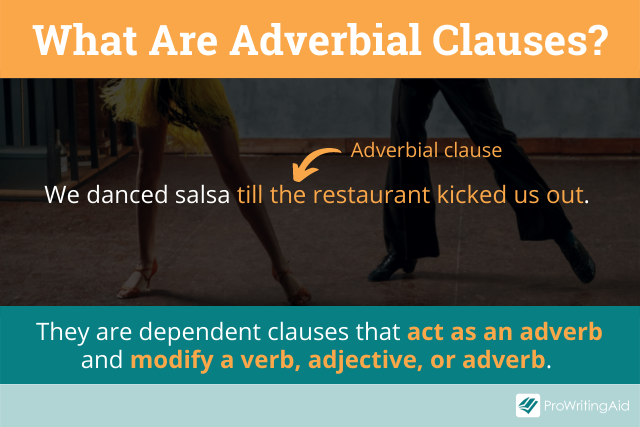
Adverbial clauses do the same thing, but instead of one word, the entire adverbial clause modifies the verb, adjective, or adverb.
Here’s an example of an adverbial clause:
- We danced salsa till the restaurant kicked us out.
This adverbial clause modifies the verb danced and answers the question How long did we dance?
Let’s look at another example:
- Wherever there is standing water, mosquitos can breed.
The adverbial clause tells us where mosquitos can breed.
Noun Clauses
Noun clauses are dependent clauses that function as nouns.
Noun clauses are an exception to one of the comma rules. If a noun clause begins a sentence, no comma is necessary before the independent clause.
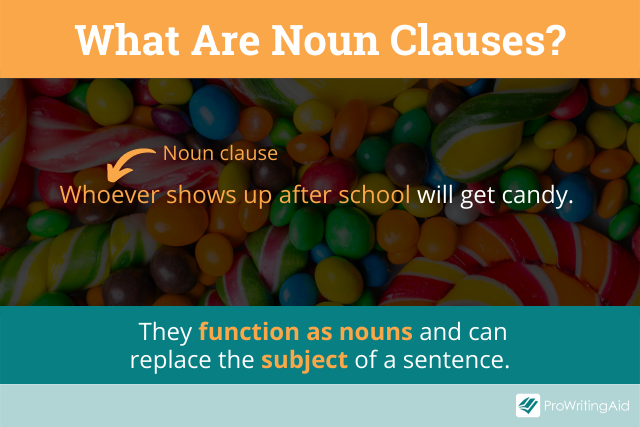
Let’s look at an example.
- Whoever shows up after school will get candy.
In this example, the noun clause replaces the entire subject of the sentence. Noun clauses can replace any noun, not just the subject.
Here’s another example of a noun clause:
- I believe that people are inherently good.
This noun clause acts as the object of the sentence.
Dependent Clause Example Sentences
We’ve looked at several examples of dependent clauses already. Here are a few more.
- When you arrive at the venue, find the wedding planner.
- My favorite cuisine is Indian because I enjoy the earthy spices like cumin and coriander.
- He still doesn’t know why she left him.
- Although she’s young, she is a force to be reckoned with in the courtroom.
- I won’t call you unless there is an emergency.
- The bar where Sally bartends is open until 2 a.m. everyday.
Remember, a dependent clause contains a subject and a verb but does not express a complete thought. Always pair your dependent clauses with an independent clause to avoid sentence fragments.



